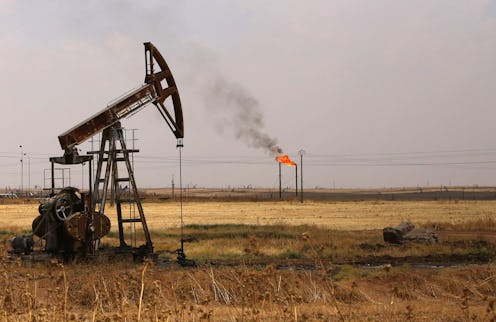News
How Does ISIS Get Money?
In spite of the price of rental cars and hotel rooms, not to mention Kalashnikovs and suicide vests, ISIS doesn't seem to have to worry much about costs while planning its attacks in Europe. That's because the terrorist group, as of last year, had assets reaching more than $2 billion. Yes, billion. According to what a senior intelligence official told The Guardian, after ISIS took over the city of Mosul in Iraq, the group robbed banks and looted military supplies worth $1.5 billion. So how does ISIS get its money? Oil.
ISIS makes its home among some of the world's largest oil reserves, and as ISIS took over large swaths of northern Iraq and Syria, they took over the many oil wells and refineries that already dotted the area. They pump it from the ground, maybe refine it, and smuggle it across the border to southern Turkey, where gas regularly tops $7 per gallon (in 2013, it was as high as $9.89). The Washington Post has reported that the group also sells antiquities, kidnaps foreigners, and taxes and extorts the residents of its territory (around the size of the United Kingdom). The group is believed to take in as much as $1 million to $3 million per day, according to estimates by the Rand Corporation.
The Treasury Department's Under Secretary for Terrorism and Financial Intelligence David Cohen, has called the group the "best-funded" terrorist organization in the world. Speaking at the at The Carnegie Endowment For International Peace last October, Cohen explained the ins and outs of the group's oil smuggling, kidnapping and extortion operations. Kidnapping alone is thought to have brought in about $35 million to $45 million in 2013 alone, the U.N. reported. Western governments — with the notable exception of the United States and United Kingdom — have largely paid off terrorists who take their citizens.
The group's extortion of residents in the area it controls can be particularly brutal. Cohen spoke of examples of the group going door-to-door demanding cash payments. Those who didn't had their stores bombed or relatives kidnapped. The group sells or rents real estate of those who flee or are killed when ISIS takes over new territory. It also sells phosphate, sulfur, and crops like barley and wheat raised on its land. Most despicably it has also sells minority women into marriage or sexual slavery.
Unlike former terror networks like al Qaeda that depended on rich benefactors, ISIS has clearly diversified. It does still receive donations, though, from rich benefactors in Saudi Arabia, Qatar, Kuwait, and the United Arab Emirates. Several Arab nations have moved to criminalize such donations since then Secretary of State Hillary Clinton criticized their role in funding the terror organization.
Cohen outlined some ways to fight ISIS's funding sources, namely sanctioning anyone trading in black market ISIS oil, close smuggling routes, and air-strikes on oil fields under the group's control. He also said the United States is working with Iraqi banks to make sure that ISIS does not have access to the international banking system. Many Iraqi banks have branches in areas under ISIS's control. Ultimately, though, Cohen admitted that as long as ISIS controls a vast swath of territory, it will be hard to cut off all sources of funding.
France is meeting with Russia and the United States following the Paris attacks to push for a coalition aimed at defeating the group. Given how so much of the funding comes from its territory, ISIS may needed to be defeated on the battlefield — not just with international banking rules. But with limited air strikes, is that possible? Obama has said ground troops would be a mistake, but there aren't many other options left unless the Syrian conflict can be solved.
